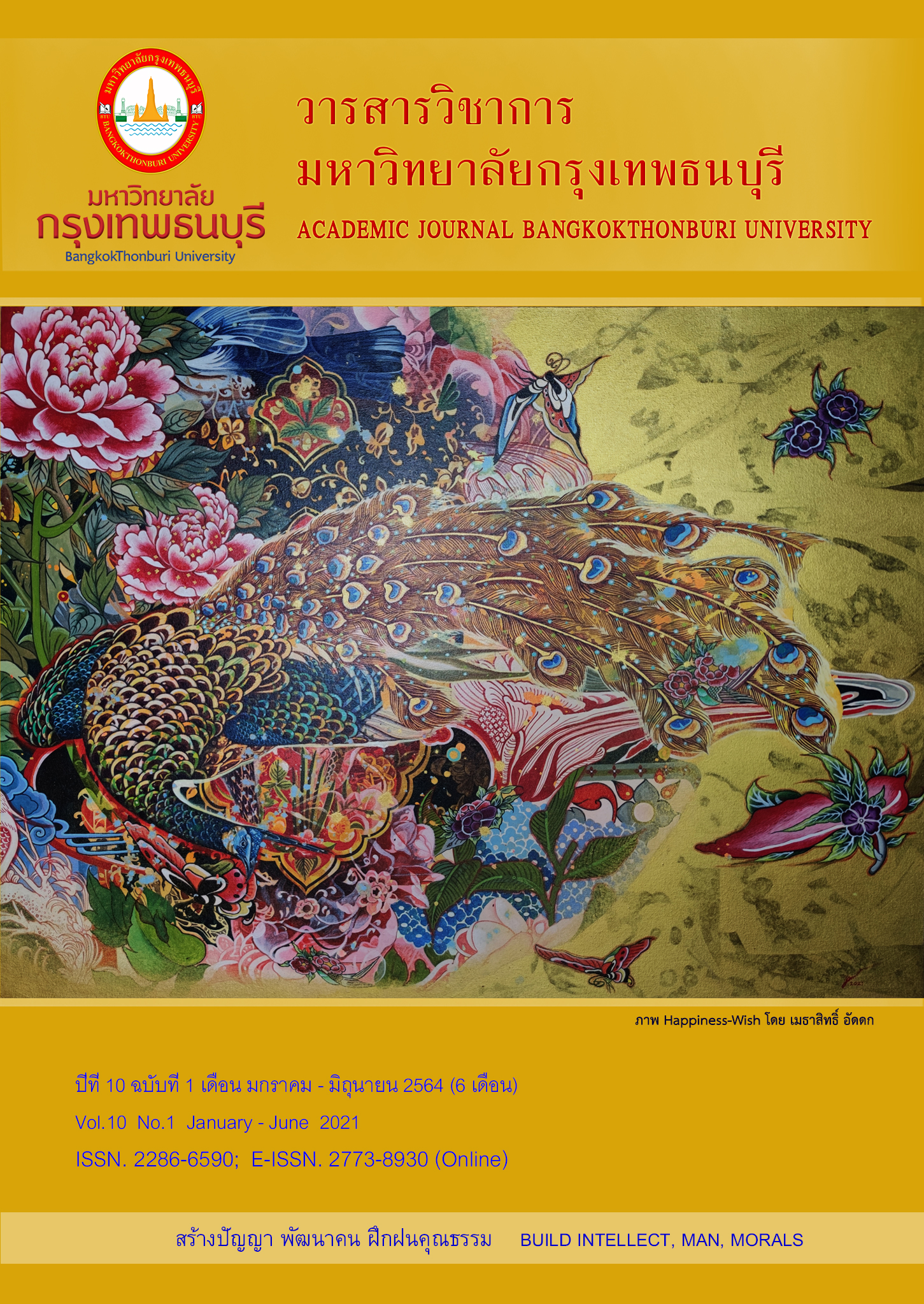Factors of acceptance for air conditioning technology (air purifiers and humidifiers) of consumers in the hotel group and laboratory in the Bangkok Metropolitan Region
Main Article Content
Abstract
Much of today's pollution and dirt has become a serious threat to human health in recent years. This research aimed to study the factors that influence the acceptance of air conditioning technology of consumers in the Bangkok Metropolitan Region. The research model is a quantitative research. The population and sample group consisted of 306 of small, medium and large factories in Bangkok and its vicinity. Data was collected from the online questionnaire and analyzed by the structural equation models with the maximum probability approximation.
The results found that most of the sample groups who answered the questions had a high level in opinion of all aspects which are Perceived Ease of Use, Perceived Usefulness, Attitude toward Using, Subjective norm, Descriptive norms, Injunctive Norm, Intention to Use and Actual Use. In relation to the variables, it was found that the factor of the perception of usefulness influenced to the factor of the attitude toward using was 0.226. The factor of the perception of ease of use influenced to the factor of the attitude toward using was 0.148. The factor of descriptive norms influenced to the factor of subjective norm was 0.113. The factor of injunctive norm influenced to the factor of subjective norm was 0.780. The factor of the attitude toward using influenced to the factor of intention to use was 0.253. The factor of subjective norm influenced to the factor of intention to use was 0.503. Finally, the factor of intention to use influenced to the factor of actual use was 0.999. The results of this research will help the entrepreneur in industry to be able to analyze and accurately meet the needs of the consumer groups.
Article Details
References
Ajzen, I. (1991). “The theory of planned behavior.” Organizational Behavior and Human Decision Processes 50 (2) :179-211.
Chen, C. (2014). A Study of the Acceptance of Wearable Technology for Consumers. An Analytical Network Process Perspective. Department of Management Sciences, Tamkang University. International Symposium of the Analytic Hierarchy Process. Washington, D. C., June 29 – July 2.
Davis.F.D, Bagozzi.R, Warshaw.P.R (1989). User Acceptance of Computer Technology: A Comparison of Two Theoretical Models. Management Science 35(8):982-1003 DOI: 10.1287/mnsc.35.8.982.
de Leeuw.A, Valois.P, Ajzen.I, Schmidt.P, (2015). Using the theory of planned behavior to identify key beliefs underlying pro-environmental behavior in high-school students: Implications for educational interventions. Journal of Environmental Psychology.Volume 42, June 2015, Pages 128-138
Fishbein, M., & Ajzen, I. (1975). Belief, attitude, intentions and behaviour: An introduction to theory and research. Boston, MA: Addison-Wesley.
Hoque, R. and Sorwar, G. (2017). Understanding factors influencing the adoption of mHealth by the elderly: An extension of the UTAUT model. International Journal of Medical Informatics, 101, 75-84. doi: http://doi.org/10.1016/j.ijmedinf.2017.02.002.
Hung, S., Tsai, C., Hung, W. and Jiang, S. (2009) ‘Critical factors of hospital adoption on CRM system: organisational and information system perspectives’, Decision Support Systems, Vol. 48, No. 4, pp.592–603.
Jain.S,Khan.M.N, & Mishra.S, (2017). Understanding consumer behavior regarding luxury fashion goods in India based on the theory of planned behavior. Journal of Asia Business Studies 11(1):4-21 DOI: 10.1108/JABS-08-2015-0118.
Janson, A., & Thiel de Gafenco, M. (2015). Engaging the appropriation of technology-mediated learning services—a theory-driven design approach. In Proceedings of the European Conference on Information Systems.
Liwa Pardthaisonga, Phaothai Sin-ampola, Chanida Suwanprasita, Arisara Charoenpanyanet (2017).Haze Pollution in Chiang Mai, Thailand: A Road to Resilience. 7th International Conference on Building Resilience; Using scientific knowledge to inform policy and practice in disaster risk reduction, ICBR2017, 27 – 29 November 2017, Bangkok, Thailand.
Macovei.O.I, (2015) Applying the Theory of Planned Behavior in Predicting Proenvironmental Behaviour: The Case of Energy Conservation. AUDŒ, Vol. 11, no. 4, pp. 15-32.
Manning.M, (2009).The effects of subjaetive norms on behavior in the theory of planned behavior : A meta-analysis.British Journal of Social Psychology,48,649-705.
Morris.M.G, and Venkatesh.V, (2000). Age differences in technology adoption decisions: Implications for a changing work force. Personnel Psychology 53(2):375 – 403 DOI: 10.1111/j.1744-6570.2000.tb00206.x.
Renny, Suryo Guritno, Hotniar Siringoringo. (2012). Perceived Usefulness, Ease of use, and Attitude Towards Online Shopping Usefulness Towards Online Airlines Ticket Purchase. Procedia - Social and Behavioral Sciences 81:212-216 DOI: 10.1016/j.sbspro.2013.06.415 Conference: 1st World Congress on Administrative and Political Sciences (ADPOL) Volume: 81.
Sánchez. M, López-Mosquera. M, Lera-López.F, Faulin.J, (2018). An Extended Planned Behavior Model to Explain the Willingness to Pay to Reduce Noise Pollution in Road. Transportation. Journal of Cleaner Production.Volume 177, 10 March 2018, Pages 144-154
Shi.H, Wang.S , Zhao.D, (2017a). Exploring urban resident’s vehicular PM2.5 reduction behavior intention: An application of the extended theory of planned behavior. Journal of Cleaner Production. Volume 147, 20 March 2017, Pages 603-613.
Shi.H, Wang.H, Zhao.D, (2017b). Exploring urban resident’s vehicular PM2.5 reduction behavior intention: An application of the extended theory of planned behavior. Journal of Cleaner Production. Volume 147, 20 March 2017, Pages 603-613
Venkatesh, V. and Brown, S.A. (2001) A Longitudinal Investigation of Personal Computers in Homes: Adoption Determinants and Emerging Challenges. MIS Quarterly, 25, 71-102.http://dx.doi.org/10.2307/3250959.
ang,S, Fan. J , Zhao. D, Yang. S, & Fu Y,(2016a). Predicting consumers’ intention to adopt hybrid electric vehicles: using an extended version of the theory of planned behavior model. Transportation volume 43, pages123–143.
Wang. Z, Gua. D, Wang. X, (2016c). Determinants of residents' e-waste recycling behaviour intentions: Evidence from China. Journal of Cleaner Production Volume 137, 20 November 2016, Pages 850-860


